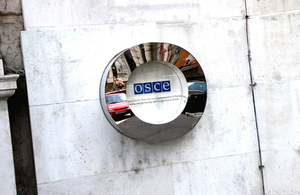UK Statement to the OSCE Permanent Council on growing tensions in the Crimean Peninsula
Ambassador Dominic Schroeder's statement to the OSCE Permanent Council on the continuing situation in Ukraine

OSCE sign at the organisation's headquarters in Vienna, Austria
Organisation for Security and Co-operation in Europe, Vienna, Austria.
13 March 2014
Mr Chairman,
I fully support the statement made on behalf of the EU and its Member States. I would like to add some short remarks in a national capacity.
The United Kingdom remains deeply concerned by the continuing and growing tensions in the Crimean Peninsula. We welcome the proposal for Secretary Kerry and Foreign Minister Lavrov to hold talks in London with a view to deescalating the situation in Crimea and setting up dialogue between Russia and Ukraine. These talks will take place tomorrow with the strong support of the UK. As the leaders of the G7, including the UK, stressed in their statement yesterday, we “urge Russia to join us in working together through diplomatic processes to resolve the current crisis and support progress for a sovereign, independent, inclusive and united Ukraine.”
The situation and possible developments over the coming weekend remain deeply troubling. I would not want there to be any doubt as to our position, made clear by my Prime Minister in his statement to Parliament on 10 March - and I quote: “We are all clear that any referendum vote in Crimea this week will be illegal, illegitimate and will not be recognised by the international community.” End of quote.
The G7 leaders have underlined that with equal clarity and force, and I quote again: “We call on the Russian Federation to immediately halt actions supporting a referendum on the territory of Crimea regarding its status, in direct violation of the Constitution of Ukraine. Any such referendum would have no legal effect. Given the lack of adequate preparation and the intimidating presence of Russian troops, it would also be a deeply flawed process which would have no moral force. For all these reasons, we would not recognize the outcome.”
I will not quote the G7 statement in full, though I commend it to anyone who has not already read it. But I will underline their call for the Russian Federation “to de-escalate the conflict in Crimea and other parts of Ukraine immediately, withdraw its forces back to their pre-crisis numbers and garrisons, begin direct discussions with the government of Ukraine, and avail itself of international mediation and observation offers to address any legitimate concerns it may have.”
We welcome and strongly support the efforts of the OSCE Institutions, Secretariat and the Chairmanship in Office, not least including Ambassador Guldimann, to develop and deploy a range of assistance and support to Ukraine. As part of that, we strongly support the proposals for a Special Monitoring Mission and believe it should deploy as soon as possible to Crimea and other parts of Ukraine.
Mr Chairman,
I promised to be short but allow me to close with the closing remarks of my Prime Minister to Parliament: “In Europe, we have spent the past 70 years working to keep the peace, and we know from history that turning a blind eye when nations are trampled over stores up greater problems for the longer term. We must stand up to aggression, uphold international law and support the Ukrainian Government and the Ukrainian people, who want the freedom to choose their own future.”